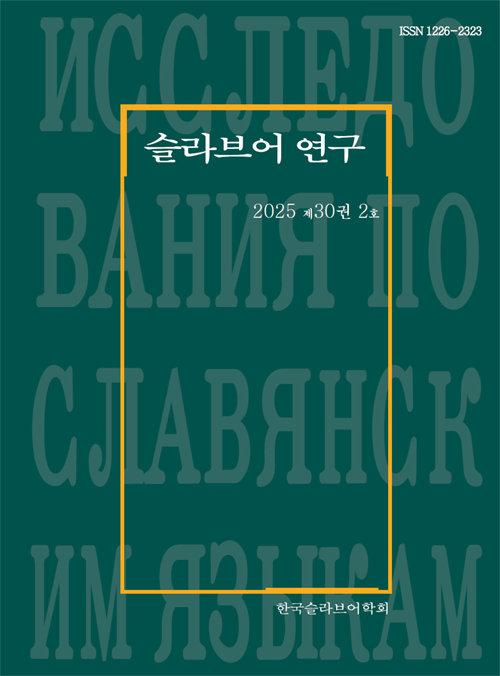- 영문명
- Rhetorical Strategies and Lexico-Semantic Features of Ecological Discourse in Russian Media
- 발행기관
- 한국슬라브어학회
- 저자명
- 권용재(Yongjae Kwon)
- 간행물 정보
- 『슬라브어 연구』제30권 제2호, 91~112쪽, 전체 22쪽
- 주제분류
- 인문학 > 기타인문학
- 파일형태
- 발행일자
- 2025.10.31
5,440원
구매일시로부터 72시간 이내에 다운로드 가능합니다.
이 학술논문 정보는 (주)교보문고와 각 발행기관 사이에 저작물 이용 계약이 체결된 것으로, 교보문고를 통해 제공되고 있습니다.

국문 초록
This study explores the characteristics of ecological discourse as represented in contemporary Russian media, with a focus on its lexical, semantic, and rhetorical features. The growing urgency of ecological issues, intensified by rapid scientific and technological development in the twentieth century, has brought environmental themes to the center of public and political communication. Within the framework of ecolinguistics, ecological discourse is understood as a communicative phenomenon that both reflects and shapes social attitudes toward the environment.
Drawing on the definitions of Ivanova (2007) and Zaytseva (2014), the paper situates ecological discourse as a set of oral and written texts across genres and styles that address ecological topics directly or indirectly. While Ivanova emphasizes scientific discourse as its core and media texts as peripheral, Zaytseva broadens the concept to include all communicative situations influencing ecological awareness. This divergence reflects the continuing ambiguity of the field in delimiting its central terms.
The analysis of Russian media demonstrates that ecological discourse often relies on emotionally charged vocabulary, rhetorical questions, euphemisms, nominalization, and neologisms. These devices attract attention, provoke emotional responses, or mitigate the severity of ecological problems. For example, ambiguous terms such as устойчивый (“sustainable”) acquire multiple meanings depending on context, while euphemisms like могильник (“burial site” for radioactive waste) illustrate emotional distancing. Neologisms such as экоцид (“ecocide”) represent linguistic creativity that resists anthropocentric views and articulates new ecological values.
Findings confirm that ecological discourse is not a homogeneous type but a complex intersection of genres shaped by political and economic contexts. While linguistic innovation contributes to ecological awareness, discourse must also be analyzed in relation to institutional power and ideology. Ultimately, ecological discourse plays a dual role: it can reinforce anthropocentric perspectives by framing nature as a resource, or it can promote eco-centric models of human–nature relations. The concept of “ecological correctness” illustrates the potential of language to reject exploitative expressions and affirm environmentally responsible values.
영문 초록
목차
1. 서론
2. 생태적 담화의 정의
3. 생태적 담화의 유형
4. 러시아 생태적 담화의 수사 전략
5. 러시아 생태적 담화의 어휘-의미적 특성
6. 결론
참고문헌
키워드
해당간행물 수록 논문
- 슬라브어 연구 제30권 제2호 목차
- 러시아어 콜로케이션 A+N의 어휘 의미-고정성 유형 분석 - 사전 및 코퍼스 자료를 중심으로
- 조어의미의 본질과 특성
- 화용화된 명령형 구문 ‘смотри(те) + не + Imp’의 경고 의미 분석
- 러시아어에서의 거절 화행 유형 연구: 간접 거절과 화행 부정의 화용적 함의
- Алгоритм ведения занятий РКИ с использованием русских паремий в корейской аудитории
- Slang vo výučbe slovenského jazyka ako cudzieho jazyka
- 러시아어와 영어 관용구의 체계적 의미 관계 고찰: 동의어와 반의어를 중심으로
- 러시아 미디어에서 생태적 담화의 수사 전략과 어휘-의미적 특성
- 포스트소비에트 공간에서의 러시아인 디아스포라와 러시아어의 상황연구
- 한강의 『채식주의자』 러시아어 번역본 번역 전략 연구 - 문학소통모델에 따른 문학번역 소통의 미학
- Виртуальная учебная экскурсия на уроках РКИ в корейской аудитории (уровни А2-В1)
- Náboženská komunikácia vojvodinských Slovákov
참고문헌
관련논문
인문학 > 기타인문학분야 BEST
더보기인문학 > 기타인문학분야 NEW
- 역사와 융합 제28호 목차
- 현행 간도 교육의 문제와 정상화를 향한 시론적 연구 - 예맥한인(濊貊韓人)의 생활세계를 반영할 수 있는 ‘한국사 교과서’의 서사 문제
- 관상학에서 심상의 귀납적 접근 시론(試論) - 바람직한 심상 관리를 위한 성음
최근 이용한 논문
교보eBook 첫 방문을 환영 합니다!

신규가입 혜택 지급이 완료 되었습니다.
바로 사용 가능한 교보e캐시 1,000원 (유효기간 7일)
지금 바로 교보eBook의 다양한 콘텐츠를 이용해 보세요!



